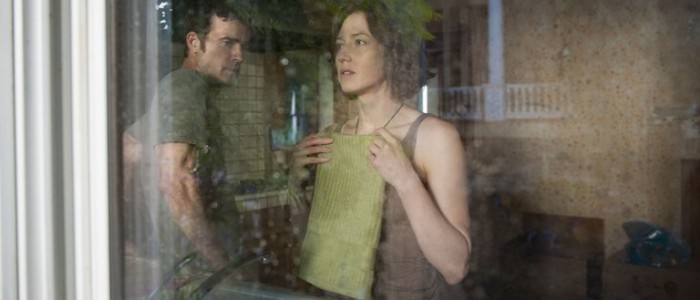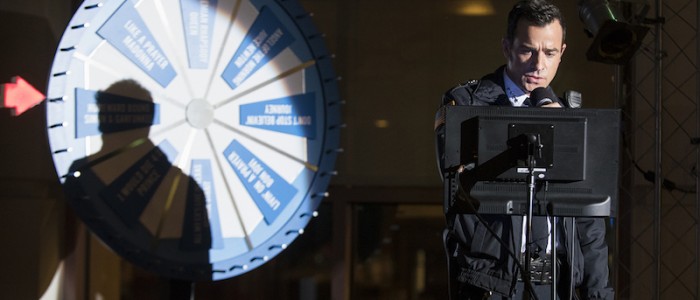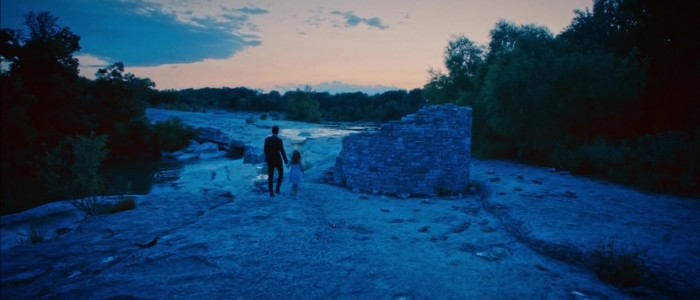Interview: Damon Lindelof Discusses What 'The Leftovers' Is Really About
The Leftovers is never afraid of showing a little soul-crushing drama. The HBO show is often bleak, but it is about loss and suffering, so why wouldn't it be? Perhaps the finest and most grueling scene in The Leftovers season two features Nora Durst (Carrie Coon) and Erika Murphy (Regina King), slowly poking each other's wounds, and director Craig Zobel (Z for Zachariah) uses some striking close-ups to fully convey their pain. It's a powerful moment, one showrunner Damon Lindelof is quite fond of.
Below, read Lindelof's thoughts on the show's unconventional style of storytelling, director Mimi Leder's work, binge-watching, and more. (Spoilers are discussed).
When a director like Craig Zobel comes in, how much do you and him discuss the style of the show and what it calls?
To be honest with you, I have a couple of visual things that I don't respond to when it comes to the show. Anything that makes me super conscious of the filmmaking I don't like, like I don't like dolly track. I don't like canted angles for this show. I don't like angles where we're looking up at the characters, like low-angle shots and wide-angle lenses for close-ups I just don't feel like live in the world of The Leftovers.
That said, sometimes the directors do it and I'm like, "Oh, that worked." I think that the shot that ends the season premiere of Erika sitting at the table is actually a tracking shot where Mimi just did this very slow move back, and I loved it.
And then, same thing in the season finale from season one where... I don't like crane shots that are just there to show you the arbitrary scope of it, but Mimi found this brilliant crane shot that comes off of dead Patti and then you see Kevin smoking a cigarette next to her. I was like, "Well, I'll be damned. I love this."

The rules are there are no rules. I completely trust Mimi to govern the language. I think that the show is like Pete Berg continued his Friday Night Lights aesthetic, which is handheld, three cameras so that you don't have to shoot a lot of coverage.
The cameramen, our operators are so amazing on The Leftovers. They are storytellers, so they go and they find the story. Then in the editing room you don't have nine different takes of characters matching. It creates a much more sort of organic feel.
I hate sets like sound stages. I like to shoot a practical location, so it feels like there are real walls and real natural light coming in and ceilings, but it's a struggle to get a boom mic in there. But when a camera moves through walls and stuff like that, I feel like on a show like Fargo, it's brilliant because there's a stylized sort of poetic tone to Fargo. On The Leftovers, it would make me feel like the show was less real in some way.
The more grounded the visual storytelling is, the more out there we can get with our musical choices. I just want the show to feel grounded and real. And again, the show is so pretentious. I don't want to apologize for that. I want to own it. It's super pretentious. Like, we're talking about religion. Pretentious, like surreal, has also become a dirty word. The shows that I love tend to be pretentious.
When people say Breaking Bad is a show about a guy who basically found out that he's going to die of cancer and he starts selling meth, I want to punch those people in the face because that's the plot of Breaking Bad, but the show is super pretentious. It's about everybody has evil inside of them. If given the right set of circumstances, you can turn the most benevolent human into a monster. That's a pretentious idea. The reason that that show transcended television is because of that, not because it was... It's the same premise of Weeds, more or less, minus the cancer diagnosis.
For you, what is The Leftovers actually about?
The show is about trying to figure out what to do when there's no one there to tell you what to do. And so, Tom [Perrotta] talks about it often, where it's like all religions fail to explain the departure. I think people need a system of beliefs and they want structure. They want someone to tell them, "This is what you are supposed to do. You are supposed to get a job, and the way that you get a job is you go to college. And the way that you go to college is you do well in high school." There's a system in place.
When that system completely and totally abandons you, do you grasp onto it anyway or do you try to build a new system?
Ultimately, I could say that the show is about suffering and it's about loss, because I think that's where its emotional weight is. When I think that The Leftovers is working at its highest level, like the Erika and Nora scene that you mentioned, you are seeing two women who are suffering very intensely. That's tapping into something that we feel. It's emotional suffering because they've lost someone that they care about and they don't understand why that happened. And it's existential suffering, which is, "I wish that I could believe in a god that would explain to me why this happened to me, but I don't. And what am I supposed to do with that?"
When Nora in episode six is suffering intensely and Wayne hugs her, the reason that that moment is so emotionally affecting is she is being unburdened by her suffering. The reason that we feel an emotional connection to Kevin while he is singing "Homeward Bound" is because he's suffering.
I feel like the show, to me, what it's about is, it's Job. It's, is there purpose to suffering? If I suffer enough, will I get a reward? Or is this why we're here on the planet, to suffer? Is there a lesson to be learned? Can we transcend through suffering? Obviously, The Guilty Remnant, that's like their whole jam, is creating an environment where they are suffering, but they also want to bring suffering to others.
So yeah, that's a great logline: season three: more suffering, where that came from.
 [Laughs.] Looking back on season two, were there any scenes in the writing process that were particularly challenging?
[Laughs.] Looking back on season two, were there any scenes in the writing process that were particularly challenging?
None of them came right away. I think that maybe I'm just trying to glamorize our Herculean effort as writers, but the show is very difficult because... This isn't to take anything away from a show like Crossing Jordan or Nash Bridges, which were the first two shows that I worked on, but those shows had very defined formulas. One of them was a show about a medical examiner who solved crimes. Every episode the writers are just basically saying, "So who is the dead body? Who killed them? What are the clues that are basically going to lead Jill Hennessy to bringing that person to justice?"
Shows like The Leftovers, you have to come up with a story every week because there's no sort of set paradigm. It is serialized, but then our goal is to make every episode feel like the season feels, which is a degree of completeness. If the problem in episode five is Matt and Mary cannot get back into Miracle and we're going to resolve that storyline at the end of this episode by Matt having the opportunity to get back in as they get their wristbands back, but he chooses not to. He chooses to exile himself because of all the things that he did to get the wristbands back.
And so, it almost feels like that's a complete episode. It has a beginning, middle, and end. That's not a cliffhanger. Matt being locked in the stocks, you are not like, "Oh, my god! How's he going to get out of the stocks?" In fact, the next episode he's out of the stocks and Nora is like, "How'd you do that?" You don't hang it on a big piece of plot, and it was the same thing with episode six.
I'd say that the challenge is designing each episode to feel like it has its own beginning, middle, and end but that it functions inside of the larger story. Obviously, once we got into the back half of the season, episode seven has a very traditional cliffhanger. Kevin poisons himself. In the next episode, "International Assassin," it feels complete in a way.
When we wrote "International Assassin" and we finished the script, I said to my wife, "I think we just wrote a really cool one. This is going to be really cool. I almost kinda don't want to write nine and 10 now. Like, we could just end the season with Kevin coming out of the ground." But then the season would have ended on a cliffhanger as opposed to kind of a feeling of completeness.

And I was just exhausted. I was also kinda feeling like... You just have that feeling sometimes. I think a lot of the television writers that I talk to experience the same thing, which is you've peaked. So, like, "Oh, International Assassin is as good as it's going to get this season." Although I think nine and 10 are really strong episodes, you can only do "International Assassin"... And I felt that way about "Guest" in season one, where we're sort of like, "Let's just take the ball and go home. Let's end the game."
That's the challenge. The challenge is making each episode feel like an episode, especially in a culture where I know that half the people who watch The Leftovers are going to binge it. When you are eating potato chips, you want to create that sensation of, like, "I'm going to eat every potato chip until the can is empty." Talking about Pringles, specifically.
[Laughs.] I binge-watched the first season, but I think this show benefits more from giving it time and waiting for the next episode.
I think some shows binge really well. It's interesting because I just binged The Man in the High Castle on Amazon. This is not a dig on that show at all, because I quite enjoyed it, but you can stop Man in the High Castle at any point in any episode. It's basically like, "I just watched an episode and I'm exhausted, but I want to watch another one," and then 20 minutes in I'm like, "I'm super exhausted, so I'll just pick this up tomorrow."
It's so serialized. It's just designed to be binged. It's an Amazon show. So you can actually put the book down in the middle of a chapter, just stick the bookmark in and you are cool. As a storyteller, I still believe in the idea of the episode. Mad Men is a show that I feel like the episodes in and of themselves, it's not designed to be binged. You shouldn't be able to stop an episode of Mad Men in the middle of an episode and then pick it up three days later. That's not the way that that show is designed.
It's endemic to the format of the storytelling that you are doing and what's driving it. But if a show has a more conventional story engine like most shows do, you can binge them. But I don't think The Leftovers is emotionally wise to binge.
If you want to read the rest of our Damon Lindelof interview, please check out part one and two.
